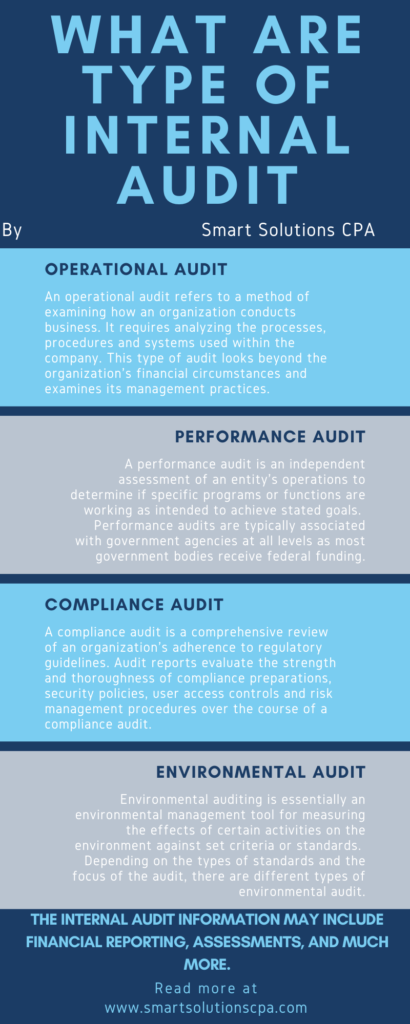Running a successful business requires efficiency in every aspect. While creating a company with ample resources initially is possible, sustaining a long-term profitable business requires more than just monetary resources. Internal audit analysis is one tool that helps evaluate any business.
What Is An Internal Audit?

Internal audit analysis includes evaluating the company’s accounting processes, corporate governance, and internal controls.
It is an unbiased review of the systems for the company’s operations.
According to Investopedia :
Internal audits evaluate a company’s internal controls, including its corporate governance and accounting processes. These audits ensure compliance with laws and regulations and help to maintain accurate and timely financial reporting and data collection. Internal audits also provide management with the tools necessary to attain operational efficiency by identifying problems and correcting lapses before they are discovered in an external audit.
The audits occur in compliance with laws and regulations. The primary function of the audits is to offer data collection and help maintain timely financial reporting.
In other simple words :
The internal audit of any company includes unbiased reviews, how the system works, the processes, and much more. It is a source of information that the senior management makes use of. Furthermore, the internal audit process also states the risk factors, operations, environmental controls, and much more.
Meanwhile, the internal audit information also takes into consideration fixing the issues. Before doing any harm to the environment or organization, the internal audit identifies the process. Further, the weaknesses of the system are also reviewed and optimized as per requirements.
Lastly, the audit will help the organization attain operational efficiency by identifying issues and offering tools to rectify lapses.
What are Internal Controls?
Internal controls of an organization include mechanisms, procedures, and rules that promote accountability and prevent fraud.
Why Is Internal Audit Necessary For An Organization?
Internal audit is part of the process of several companies. In this process, an outside party checks the internal controls of the company. If any discrepancies are found, the organization can be held responsible. An internal audit gives companies a chance to review the system beforehand.
Internal Auditor Services in the US helps with
- The importance of internal audit in strategic management includes finding bugs before the statutory audit from external auditor services.
- With an efficient internal audit team, companies are less likely to have frauds and errors.
- The process helps build the trust of shareholders and safeguards management’s assets.
- Helps prepare plans and policies for long and short term
Chartered accountant is responsible for running internal audits for companies. But, as there are fewer restrictions for the appointment of internal auditors, businesses can hire other professionals as well.
What Is The Internal Audit Procedure?
Internal audit procedure happens in four phases.
-
Planning
During the planning process, the team determines the scope and objectives of the audit. This step also includes discussing budgets, audit plans, owner involvement, and scheduling the kick-off meeting to start the audit.
-
Fieldwork
After planning comes execution. Here, the auditor’s team will complete the audit plan. Auditors will interview the people on the floor to understand the process, review documents, test the controls, and document the results.
Here, the team will document everything to identify exceptions and make appropriate recommendations.
-
Reporting
After the execution of the process, reporting starts. Here, the team will create an audit report that is concise and thorough.
Then, review the document with the management to ensure accuracy. Once the report finalizes, distribute the final document to relevant people.
-
Follow-up
The process isn’t over after completion and distribution of the report. Following up is crucial to ensure that companies implement the recommendations.
Now you will understand what is internal audit so now we will discuses further:
What Are Internal Auditors Responsible for?
When it comes to the role of internal audit, it often seems time-consuming. In addition to this, the person who reviews it will surely end up finding it dissatisfied. Here, the person responsible for the audit should have knowledge of what to avoid, what things to add and make it a pleasant experience.
Internal vs. External audit – Know the difference
Both of them are associated with the organization’s system and the processes. Rest; look at how they differ.
-
Performing the audit
Talking about who performs the respective audit, the internal auditors are responsible for the internal audit. They are the employees of the company. Whereas, external audit is performed by the CPA agency or firm.
-
Reporting of the audit
The employees of the company responsible for internal audit report to the members of the management. Meanwhile, external audit mostly focuses on shareholders, and members external to the company.
-
What is included?
Here, the internal audit process takes into consideration the governance, improvement of the process, as well as managing the risks. Whereas, financial reporting and internal controls make a part of the external audit.
-
The need for audit
From managing the risks to improving the governance, and controlling process, an internal audit takes place. It provides internal audit information to the board of directors and top management.
External audits are needed to provide financial reports to the shareholders. Further, it helps in assuring the validity of the information.
What does an internal auditor do?
It is a rough world out there filled with a competitive environment. Surviving these days is not as easy as it was earlier. Now things have changed with too many brands, the marketing skills, pricing factor, and much more. To safeguard the organization from pitfalls, risks, and other factors, an internal audit is required.
The person who is responsible for the internal audit is known as the internal auditor. They ensure that the company is able to survive in the market. Further, the internal audit process also focuses on business growth.
Now, if you ask what an auditor does, look at the pointers below.
- They analyze the situation, monitor, and assess the risks thereby controlling them.
- Take into consideration the federal laws and policies. Further, the organizational process should comply with the laws.
- Reassure the organization’s board of directors and the management of valid recommendations.
Note: The main objective of the internal auditor is to show how the organization is performing. Further, the internal audit information states how the organization can improve and prosper.
Internal Audit – The Types
The internal audit information may include financial reporting, assessments, and much more. Meanwhile, there are five types of internal audits. Look at them below.
- Operational audit: It helps in assessing the company’s mechanism and how to provide efficiency and reliability.
- Performance audit: Whether the company has met the set metrics to achieve the goals is defined here. The board of directors has set the objectives, which are to be achieved.
- Environmental audit: It states how the company’s operation affects the environment. It should comply with the regulations.
- Compliance audit: Here, the policies and regulations are focused on. How they affect the working of the company’s financial stature is notified.
- IT audit: It includes the infrastructure and ensures how accurate they are. How the processes are kept confidential internally. Further, it also includes how the system operates, insights about backup and recovery during emergencies.

Conclusion
Internal audit offers several benefits to the companies. Moreover, it is mandatory for companies that want to pass the statutory audit. We have defined the role of internal audit, differentiated it with external audit, and much more. If you are looking for internal auditor services in the USA, do not look for more. Visit this page, and discuss your business process.
Overall, internal audits are a tool that companies should use to comply with the laws and improve upon the trust of shareholders.

